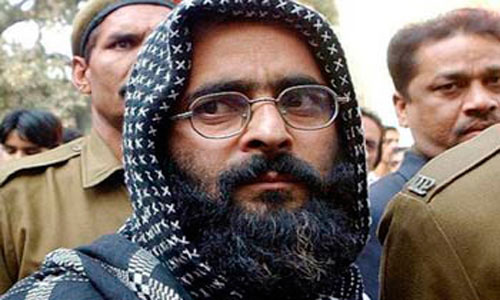Why Shouldn’t We Discuss Afzal Guru?
By Sreekumar Kodiyath
25 February, 2016
Countercurrents.org

Mohammed Afzal Guru, the only accused sentenced to death in the parliament attack incident of 2001 was secretly hung on 9th February, 2013. His body was buried hastily inside the jail compound by the authorities and it was only then that the world was informed of this “operation”. The idea was to prevent any delay that might have been caused by a possible judicial review of his mercy petition’s rejection by the President of India.
As an expatriate student during that time, I and many of my friends with me had to vent our shock and anger through the social media and our group discussions. We were already concerned about the trial process, flawed death penalty jurisprudence of the Supreme Court of India and how democratic institutions sometimes defer to public pressure. It was the faulty trial and evidence which bothered us the most. Internet in general was rife with debates. There were ones who were completely against death penalty and ones who supported awarding of death penalty in exceptional cases. What everyone agreed was on the case miserably failing below the standards laid down by Supreme Court of India in the Bachan Singh v. State of Punjab (1980) including the “rarest of rare” test. What intrigued us was how someone could be hung on the basis of a trial without a proper lawyer and fabricated evidence. What bothered us more was how all the flaws were acknowledged by the court and yet it proceeded to direct his hanging. We discussed it till we were exhausted, read every opinion on it and debated for days and nights.
The scene shifts to February, 2016 and we wake up to the massive controversy and the turn of events subsequent to the programme conducted by students of JNU on the anniversary of Afzal Guru’s hanging. What was difficult for me to fathom is the fact that the programme was organised to discuss the same incident which we had openly discussed, condemned and wrote about extensively back in 2013. More interesting was how the same person had been transformed from being the victim of a flawed trial to “the parliament attacker terrorist” conclusively and how even a mere reference to his trial and execution is being suddenly regarded with suspicion and anti-nationalism. While the despicable prime time television’s analogous reference to Afzal, “the terrorist” and the brave jawans of the army side by side was not surprising, difficult to comprehend was the relative quiet on this topic in every other discussion. It was somehow a Kashmiri issue now. Even in few regional protests organised against the treatment of the JNU students, the organisers confessed that Afzal Guru shouldn’t be mentioned as that would be highlighted by the media and the topic diverted.
Then came the surrender of the JNU students and their interrogation by the Delhi Police which too were littered with references to Afzal Guru. This was one obsession for the nation in 2016. Are you with Afzal Guru or with us?
And a fear is slowly gripping the entire country. Quietly, a polarisation is taking place which is invading even into our personal spaces. Thinking and debating platforms are shrinking and whatever is left is being dominated by shouting matches. Borrowed phrases from Rwandan génocidaires find their presence in the vocabularies of the so called “patriots”. Maoist and terrorist identities are conveniently attributed to quell dissent. State begins to regard learning and academia with a Khamer Rougian hostility.
It is in this context that there is a need to force the topic back into the discussion spaces. If debates on the freedom of expression are what we are fighting for, then an opinion on the hanging of Afzal Guru is a part and parcel of the same. It would be unwise to ignore one at the cost of the other. It is not the problem of Kashmiris alone, but his fate can befall anyone who questions the narratives of the state especially in the present political climate.
Afzal Guru’s case and his execution isn’t something which we can proudly flaunt as an example of our legal process. It only exposes the decayed core of our policing system, trial processes and the state of affairs in the lower judiciary. While 80 witnesses were examined on behalf of the prosecution, Afzal Guru’s court-appointed lawyer found it convenient to do nothing. While meeting and discussing the case with a client is crucial for devising defence strategy and arguments, the court-appointed lawyer felt it convenient to avoid such a meeting. While the evidence against Afzal was evidently tampered with, his court appointed lawyer found it convenient to remain silent.
This is not intended to be an exhaustive critique of the case. Carefully wading through 107 pages of the Supreme Court judgement exposes one to numerous other inconsistencies, lapses and logical fallacies. The message that is intended to be conveyed is the susceptibility of the system to be abused. An image or video in your laptop computer or phone can take you all the way to hangman’s scaffold.
Our anti-terrorism laws and the arbitrary nature of many of their provisions deserve to be discussed and debated. Our system of awarding death penalty deserves to be discussed and debated. The way in which trial court functions deserves to be discussed and debated. The archaic policing system inherited from the colonial rulers deserves to be discussed and debated. The way in which we condone torture in custody deserves to be discussed and debated. And as long as a person has been hung under the shadows cast by the festering rots in our institutions, his case would forever remain a bloat in the landscape of justice and democracy. Mentioning it becomes necessary to ensure that we learn from our mistakes. Remembering it becomes necessary to prevent its repetition. Discussing it becomes necessary to affirm our commitment to free speech.
Sreekumar Kodiyath is an independent researcher

